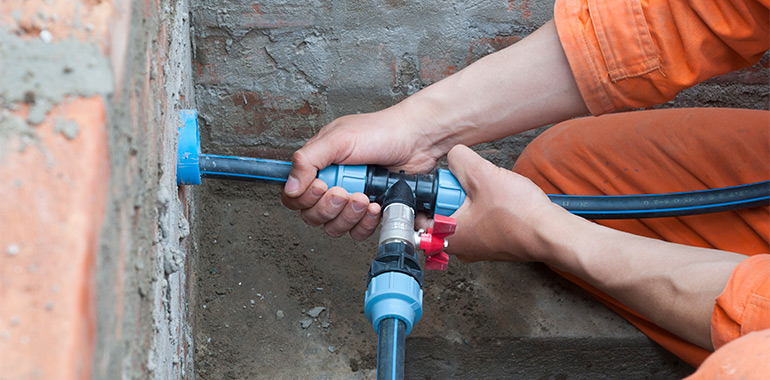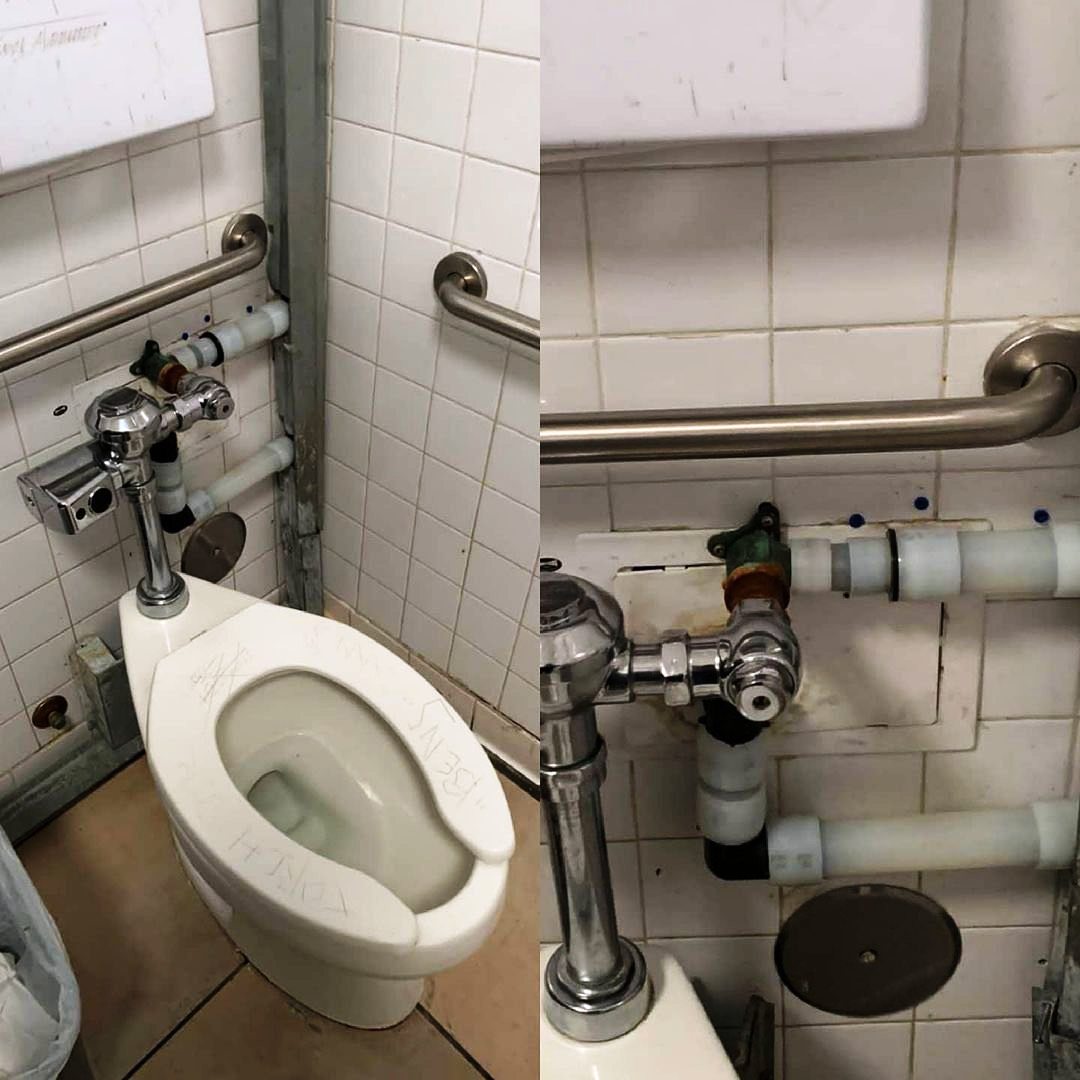Why is My Home Making Odd Plumbing Noises?
Why is My Home Making Odd Plumbing Noises?
Blog Article
We have discovered this article involving Why Do My Plumbing Pipes Make A Knocking Noise directly below on the internet and think it made sense to discuss it with you in this article.

To identify noisy plumbing, it is very important to establish initial whether the undesirable audios take place on the system's inlet side-in other words, when water is turned on-or on the drain side. Noises on the inlet side have differed reasons: extreme water stress, used shutoff as well as tap components, improperly linked pumps or other appliances, incorrectly put pipeline bolts, and plumbing runs containing way too many tight bends or other restrictions. Noises on the drain side typically come from bad location or, as with some inlet side noise, a layout containing limited bends.
Hissing
Hissing sound that takes place when a tap is opened somewhat normally signals extreme water pressure. Consult your neighborhood public utility if you presume this issue; it will be able to tell you the water stress in your location as well as can set up a pressurereducing valve on the incoming supply of water pipe if necessary.
Various Other Inlet Side Noises
Squeaking, squeaking, scratching, snapping, as well as tapping usually are brought on by the development or tightening of pipes, usually copper ones providing hot water. The sounds take place as the pipelines slide against loose bolts or strike close-by house framework. You can usually determine the place of the problem if the pipelines are subjected; just follow the audio when the pipes are making noise. More than likely you will discover a loosened pipe wall mount or an area where pipelines lie so close to flooring joists or various other mounting pieces that they clatter versus them. Connecting foam pipe insulation around the pipelines at the point of get in touch with ought to remedy the issue. Be sure bands as well as hangers are safe and secure as well as provide ample support. Where feasible, pipe fasteners must be affixed to huge architectural elements such as structure walls as opposed to to framing; doing so decreases the transmission of vibrations from plumbing to surface areas that can enhance and also transfer them. If affixing fasteners to framework is inevitable, cover pipes with insulation or various other durable product where they get in touch with bolts, and also sandwich the ends of brand-new fasteners in between rubber washers when installing them.
Remedying plumbing runs that deal with flow-restricting tight or many bends is a last resort that must be undertaken just after consulting a proficient plumbing contractor. Sadly, this circumstance is fairly typical in older residences that may not have been constructed with indoor plumbing or that have seen numerous remodels, especially by novices.
Babbling or Screeching
Intense chattering or shrilling that occurs when a valve or tap is activated, and that normally goes away when the fitting is opened completely, signals loosened or malfunctioning internal parts. The option is to change the valve or faucet with a brand-new one.
Pumps and also appliances such as washing makers and also dish washers can move motor noise to pipes if they are poorly attached. Link such items to plumbing with plastic or rubber hoses-never stiff pipe-to isolate them.
Drainpipe Noise
On the drainpipe side of plumbing, the principal objectives are to eliminate surfaces that can be struck by falling or rushing water as well as to shield pipes to include inevitable audios.
In brand-new construction, bath tubs, shower stalls, commodes, and wallmounted sinks and basins ought to be set on or against resistant underlayments to decrease the transmission of noise via them. Water-saving toilets and faucets are less noisy than traditional designs; install them instead of older types even if codes in your area still permit using older fixtures.
Drainpipes that do not run vertically to the basement or that branch into horizontal pipe runs supported at floor joists or other framing present especially frustrating sound troubles. Such pipelines are huge sufficient to emit substantial resonance; they likewise carry significant amounts of water, that makes the scenario even worse. In brand-new building, define cast-iron soil pipes (the large pipes that drain commodes) if you can manage them. Their enormity includes much of the noise made by water passing through them. Additionally, stay clear of directing drainpipes in walls shared with bedrooms and also areas where individuals collect. Walls including drainpipes need to be soundproofed as was defined previously, utilizing double panels of sound-insulating fiberboard and also wallboard. Pipelines themselves can be wrapped with special fiberglass insulation created the function; such pipes have an impervious vinyl skin (in some cases containing lead). Outcomes are not constantly adequate.
Thudding
Thudding noise, usually accompanied by shuddering pipelines, when a faucet or home appliance valve is shut off is a problem called water hammer. The sound and also resonance are caused by the resounding wave of pressure in the water, which instantly has no location to go. Occasionally opening a shutoff that discharges water promptly into an area of piping including a limitation, elbow, or tee fitting can generate the exact same problem.
Water hammer can typically be healed by setting up installations called air chambers or shock absorbers in the plumbing to which the issue shutoffs or faucets are attached. These devices enable the shock wave created by the halted flow of water to dissipate airborne they include, which (unlike water) is compressible.
Older plumbing systems might have short upright areas of capped pipe behind wall surfaces on faucet competes the very same function; these can at some point fill with water, minimizing or damaging their effectiveness. The remedy is to drain pipes the water system totally by shutting off the primary water valve as well as opening up all faucets. Then open up the major supply valve as well as shut the faucets one by one, beginning with the tap nearest the valve and finishing with the one farthest away.
3 Most Common Reasons for Noisy Water Pipes
Water hammer
When water is running and is then suddenly turned off, the rushing liquid has no place to go and slams against the shut-off valve. The loud, thudding sound that follows is known as a water hammer. Besides being alarming, water hammer can potentially damage joints and connections in the water pipe itself. There are two primary methods of addressing this issue.
Check your air chamber. An air chamber is essentially a vertical pipe located near your faucet, often in the wall cavity that holds the plumbing connected to your sink or tub. The chamber is filled with air that compresses and absorbs the shock of the fast moving water when it suddenly stops. Unfortunately, over time air chambers tend to fill with water and lose their effectiveness. To replenish the air chambers in your house you can do the following. Turn off the water supply to your house at the main supply (or street level). Open your faucets to drain all of the water from your plumbing system. Turn the water back on. The incoming water will flush the air out of the pipes but not out of the vertical air chamber, where the air supply has been restored. Copper pipes
Copper pipes tend to expand as hot water passes through and transfers some of its heat to them. (Copper is both malleable and ductile.) In tight quarters, copper hot-water lines can expand and then noisily rub against your home's hidden structural features — studs, joists, support brackets, etc. — as it contracts.
One possible solution to this problem is to slightly lower the temperature setting on your hot water heater. In all but the most extreme cases, expanding and contracting copper pipes will not spring a leak. Unless you’re remodeling, there's no reason to remove sheetrock and insert foam padding around your copper pipes.
Water pressure that’s too high
If your water pressure is too high, it can also cause noisy water pipes. Worse, high water pressure can damage water-supplied appliances, such as your washing machine and dishwasher.
Most modern homes are equipped with a pressure regulator that's mounted where the water supply enters the house. If your home lacks a regulator, consider having one professionally installed. Finally, remember that most plumbers recommend that water is delivered throughout your home at no lower than 40 and no greater than 80 psi (pounds per square inch).
Whatever the state of your plumbing, one thing is certain — you’re eventually going to encounter repair and replacement issues around your home that require professional help. That’s where American Home Shield can come to your aid.
https://www.ahs.com/home-matters/repair-maintenance/causes-of-noisy-water-pipes/

I am just very fascinated by Why Your Water Pipes Are Noisy and How To Shut Them Up and I really hope you appreciated our blog entry. I beg you take the opportunity to distribute this content if you enjoyed it. Thanks so much for going through it.
Book Appointment Now Report this page